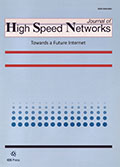Authors: Shinko, Ilir | Kolici, Vladi | Barolli, Admir | Oda, Tetsuya | Barolli, Leonard | Xhafa, Fatos
Article Type:
Research Article
Abstract:
In this paper, we evaluate the performance of two Wireless Mesh Networks (WMNs) architectures considering throughput, delay, jitter and fairness index metrics. For simulations, we used ns-3, Distributed Coordination Function (DCF) and Optimized Link State Routing (OLSR). We compare the performance of WMN for different Transmission Control Protocol (TCP): Tahoe, Reno and NewReno considering normal and uniform distributions of mesh clients by sending multiple Constant Bit Rate (CBR) flows in the network. The simulation results show that for normal and uniform distributions and both WMN architectures, the PDR values are almost the same. For Hybrid WMN, the throughput of TCP
…NewReno is good, but for I/B WMN, the throughput of TCP Tahoe is higher than other algorithms. For normal distribution, the delay and jitter of I/B WMN are lower compared with Hybrid WMN, while for uniform distribution, the delay and jitter of TCP NewReno are a little bit lower compared with other algorithms. The fairness index of normal distribution is higher than uniform distribution.
Show more
Keywords: Genetic algorithms, wireless mesh networks, NS-3, network architecture, OLSR, multiple flows, TCP congestion-avoidance algorithm, SGC, NCMC, client distributions
DOI: 10.3233/JHS-170563
Citation: Journal of High Speed Networks,
vol. 23, no. 2, pp. 163-173, 2017
Price: EUR 27.50





